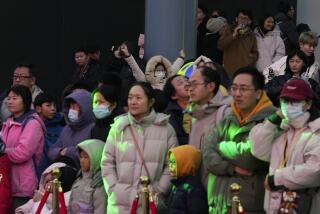As Birthrate Drops, China Must Face Up to Growing Problem of Caring for Elderly
- Share via
BEIJING — The Chinese are living longer, and a nation that is trying to reduce the birthrate now is seeking new ways to care for growing numbers of elderly.
At least 87 million people are 60 and over--slightly more than 8% of the total population of 1 billion--and that share is expected to leap to more than 20% by the year 2025, according to government statistics.
At 69 years, China’s life expectancy ranks among the world’s longest. The average life expectancy in the United States is about 71.
China faces a host of problems in taking care of its elderly.
The economy is developing, the majority of people are not covered by pensions and health care lags behind developed countries.
Children are legally and traditionally bound to care for elderly parents, but China’s current one-child policy, aimed at reducing population growth, will result in the future in fewer children to care for parents.
“The increasing elderly population is going to have some social repercussions,” said Fan Yong Qian, a Beijing official involved with the elderly. “The government will have to take a greater hand in care. Facilities in China are not as advanced as in other countries.”
China has very few amenities for elderly or disabled people. Elevators often do not work. The most common forms of transportation are bicycles and crowded buses.
Housing Plans
China has a mandatory retirement age of 60 for men and 55 for women in government and 55 and 50, respectively, for other workers.
The government is considering building compounds exclusively for elderly who would hand over their savings in exchange for housing and food.
Such housing would answer the needs of elderly who prefer not to live with their children, Fan said.
Liu Ping, a 65-year-old retired hospital worker, said he looked forward to living in such a home, even though he has children.
“I would rather live in the company of old friends,” he said.
To assure financial security of retirees, China has been overhauling its limited pension system.
Under the current system, each enterprise pays pensions to its own retirees, but that program isn’t fully effective, said Qiu Shanqi, a deputy division chief of the Ministry of Labor.
He added that the government is experimenting with a system where each enterprise would pay an amount of money proportionate to workers’ earnings to local authorities who would then distribute pension payments when the workers retire.
Currently about 10 million state enterprise retirees--about three-quarters of all such retirees--receive pensions, but only 1 million rural elderly are so fortunate, Qiu said.
About 80% of China’s 1 billion people live in the countryside.
Shortage of Doctors
“Our economy is not very good and development is very different between cities and towns,” Qiu said. “We’re just learning (about pensions) from other countries.”
A major shortage of doctors affects health care for the elderly. China has a total of 720,000 doctors--seven doctors per 10,000 people, compared to 40 per 10,000 in advanced countries, according to government statistics.
China’s happiest elderly may be those who hold fast to the Confucian teachings that children should care for aging parents.
One of those is Ma Zhengmeng, a 55-year-old retired bus conductor who now takes care of her granddaughter while the child’s parents work. She says she does not worry about being left without care when she gets older.
“My children feel a responsibility to me just as I feel a responsibility for taking care of this child,” she said.
More to Read
Sign up for Essential California
The most important California stories and recommendations in your inbox every morning.
You may occasionally receive promotional content from the Los Angeles Times.













